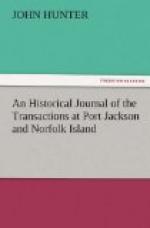In the afternoon, a creek obliged them to leave the banks of the river, and go round its head, as it was too deep to cross: having rounded the head of this creek, they found themselves on the borders of a river not more than eighty feet wide; the banks were low, and covered with a thick brush, which did not make walking less laborious to those who went first. Their view was now very contracted, the ground rising on the right so as to confine the prospect to fifty or one hundred yards; and what they could see was mostly a poor stony soil. In the afternoon, they fell in with one of the native’s hunting-huts, which Colebe and Ballederry would have cut to pieces, had not Governor Phillip prevented them; they said it belonged to their enemies, and they were much displeased at not being permitted to destroy it.
The natives were known to eat a grub which is found in the small gum-tree, and when our party came to the creek already mentioned, a native fled on their approach, leaving his fire, and some decayed wood he had drawn out of the creek, for the purpose of procuring a large worm which is found in it, and which they eat. The smell of this wood is so strong, that few Europeans are able to bear it for any length of time; indeed, it cannot be distinguished from the foulest privy.
At four o’clock the party halted and made fires for the night, being all pretty well tired. Just before they stopped for the night, several natives were heard, and Colebe and Ballederry wanted to join them, but they went away in their canoes.
In the morning of the 13th, the party set off again, still following the creek, which was now little larger than a good ditch, and went through a very barren rocky country, until noon, when, being at the head of the creek they crossed it, and, after resting some time, they endeavoured to go to the north-west, in order to fall in with the river which they had lost by going round the creek in the afternoon of the preceding day; but they were soon stopped by a deep ravine; and the surgeon going to a rising ground on the left, saw the country open to the westward, and thought he could distinguish Richmond-Hill; this led them all to the spot, and, from the break in the mountain, and the trending of the land, Governor Phillip imagined it to be Richmond-Hill, which they saw, being the southern extremity of a range of hills. It bore west by south, and appeared to be from eleven to thirteen miles distant, as near as could be determined.
The place from whence our party had this prospect, was called -Tench’s Prospect-Hill_, that officer being of the party, and having from thence seen Richmond-Hill for the first time.
The spot where they had made the river on the 12th, being little more than four miles distant, it was thought best to return there, and from thence to trace the river to the westward till they got opposite to Richmond-Hill. The Governor was well aware of the difficulties they would have to encounter on the banks of a river where walking was laborious, and every little creek they met with would oblige them to follow it up the country till they could cross it; but in a country like this, you may travel many miles through the woods and not get sight of very high land, though it may not be half a mile from you.




